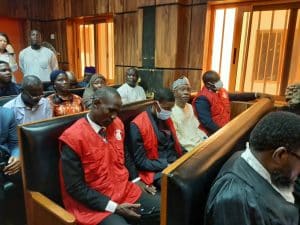Following the Enugu State Electricity Law signed by Governor Peter Mbah and the recent constitution of the Enugu State Electricity Regulatory Commission, ESERC, by the Mbah administration, the Nigerian Electricity Regulatory Commission (NERC) has formerly transferred the regulatory oversight of the Enugu State electricity market to the state agency effective May 1, 2024.
This is the first time NERC would be ceding such regulatory authority to any state electricity regulatory agency.
The transfer was made known by NERC on Monday in an April 22, 2024 Order No. NERC/2024/039 signed by the Commission’s Chairman, Sanusi Garba, and the Commissioner for Legal, Licensing, and Compliance, Dafe Akpeneye.
The transfer is sequel to the amendments of the Paragraph 14 (b) of the Second Schedule to the 1999 Constitution by the 9th National Assembly in 2023 as well as the Electricity Electricity Act 2023, both of which effectively devolved power generation, transmission, and distribution from the Exclusive List to the Concurrent List and also empowered the states to manage and regulate their electricity markets within their jurisdictions.
It is recalled that the Mbah administration initiated the Enugu State Electricity Bill 2023, which the governor signed into Law in September the same year and also set the pace in March 2024 constituted the Enugu State Electricity Regulatory Commission (ESERC) led by Chijioke Okonkwo as the Chairman/CEO.
The Electricity Act 2023 provides that within 45 days of receiving formal notification of the enactment of the law under subsection (1), the Commission (NERC) shall draw and deliver to the State Regulator a draft order setting out a plan and timeline for the transition of regulatory responsibilities from the Commission to the State Regulator, which transition shall be completed not later than 6 months from the date on which the formal notification in subsection (1) was delivered to the Commission.
Explaining further, NERC said the ESERC now holds the exclusive power to set and adopt end-user electricity tariffs within Enugu State, tailoring these charges to local conditions and requirements.
Also, while ESERC manages local tariff methodologies, any electricity sourced from grid-connected plants and the related tariffs for generation and transmission services must still receive approval from the Nigerian Electricity Regulatory Commission (NERC), ensuring alignment with national energy policies.
Furthermore, the final tariffs approved by ESERC for consumers in Enugu State will be definitive for the state, with the Enugu State Government responsible for supporting and implementing tariff-related policies, ensuring that electricity pricing is both fair and attuned to the specific needs of the state’s residents.
Consequently, NERC ordered that: “Enugu Electricity Distribution Company PLC, EEDC, is hereby directed to incorporate a subsidiary EEDC SubCo under the Companies and Allied Matters Act for the assumption of responsibilities for intrastate supply and distribution of electricity in Enugu State from EEDC.
“EEDC shall complete the incorporation of EEDC SubCo within 60 days from the effective date of this Order and, EEDC SubCo shall apply for and obtain a licence for the intrastate supply and distribution of electricity from EERC.
“EEDC shall identify the actual geographic boundaries of Enugu State and carve out its network in Enugu State as a standalone network with the installation of boundary meters at all border points where the network crosses from Enugu State into another state.
“EEDC shall create an Asset Register of all its power infrastructure located within Enugu State.
“Evaluate and apportion contractual obligations and liabilities attributable to EEDC’s operations of its subsidiary in Enugu State.
“Identify all the applicable trading points for energy o take for the operations of EEDC SubCo in Enugu State
“Confirm the number of employees that are required to provide service to Enugu State as a standalone public utility; and transfer the identified assets for operations in Enugu State, contractual obligations, liabilities and employees to EEDC Subco.”

.png)









